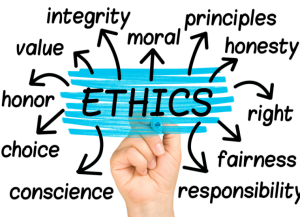I chose the first example because I think it is imperative that people have a good relationship with their clients but where are you supposed to draw the line to stop yourself from burnout. Social work is a job where you consistently give so it’s important to take care of yourself first. While I do think it’s a good thing to have your clients feel like they can contact you whenever to establish that trust it appears to me that it may become draining as you gain clients or a client may start to treat you more as a friend and step out of that professional threshold. An anecdote to this may be getting a work phone and having the choice to work after hours on your own without it being forced on you like it would with your personal phone also having automated responses for things you may not need to respond to directly like scheduling.
I chose ethical judgements, it is all up to discretion and what every specific person may find appropriate. Things may not be an issue to certain clients/social workers but it may be an issue to others so I think it’s smart for people to be extra cautious when it comes to these judgements. An example of this would be a social worker contacting someone after hours about their well-being, while it may be harmless, this can be taken inappropriately on many levels. After reading “Focusing on individuals’ ethical judgement in corporate social responsibility curricula” I realized that ethical judgement is also an issue people face in other professional settings such as the corporate setting with not only clients but coworkers in a business setting as well.
I definitely agree with a social media policy between client and social worker that benefits both sides. It is harmful to clients as well as it stated in the article how some like to exploit their clients’ trauma, I think this is a huge problem. In my social media policy I would require for things said during our sessions not to be shared on the media and limited access to my social media, as someone who has a few public pages, It would be okay to view but any interaction would be completely unacceptable in my policy and vice versa, nothing I see on social media will be brought up in sessions with a client. This strategy will work in my opinion because it will end the overlap between personal and professional boundaries and will solve many ethical challenges.
Maclagan, P., & Campbell, T. (2011). Focusing on individuals’ ethical judgement in corporate social responsibility curricula. Business Ethics: A European Review, 20(4), 392–404. https://doi.org/10.1111/j.1467-8608.2011.01634.x

Thank you for your post. Your perspective really stood out to me, especially when you mentioned the challenge of balancing client relationships with self-care. I agree that social work is a field where we’re constantly giving, and if we don’t set boundaries, it can quickly lead to burnout. I liked your idea of using a separate work phone and automated responses to manage communication outside work hours. It seems practical to maintain boundaries while still showing clients that you care.
I found this conversation about tech and social work enlightening for the self-care element as well…as it is something I have been thinking about for myself often. How do we protect our space and our peace as folks who are so drawn to service. Something I have been considering, which maybe you can relate, is how to a balancing showing up as a caring person you can lean on for those in my personal life, while doing the heavy work of being that for strangers as well?
Jade,
The issues you raise in question one are the major issues of this article, right? We are faced in the digital environment of creating a balance between the relationship we want to establish with our clients and the need to balance personal and professional lives. The idea of this discussion is that the digital realities have changed the way we think about this process. You are right that constant contact can lead our clients to have unrealistic expectations. That can lead to confusion about the parameters of the relationship. That is why it is important for the social worker to be very clear.
On question two, I agree that reaching out to a client would be confusing to them. I can’t really think of any reason a social worker would contact a client to see how they are doing unless that contact was established as part of the ongoing treatment plan agreed to by both client and social worker. I wasn’t able to have a clear understanding of the article you read from the sentence you included.
I agree that a social media policy would be important to clarify these roles. However, you don’t need to include that you wouldn’t put what occurs in the session online, as you are prohibited from talking about the session anywhere by rules of confidentiality in the code of ethics. Reamer talks about this, and suggests that clients and social workers don’t follow each other on social media.
Dr P